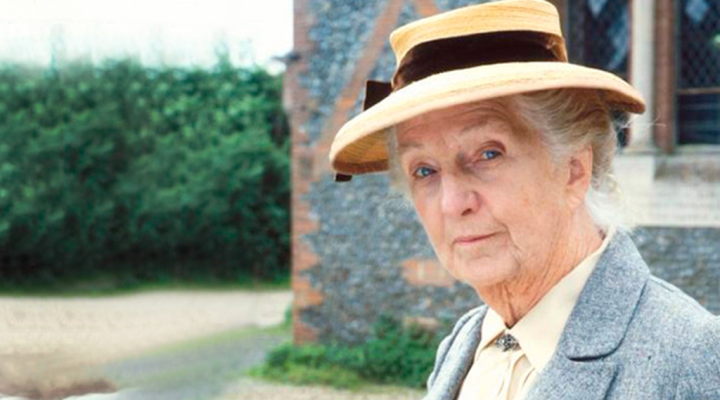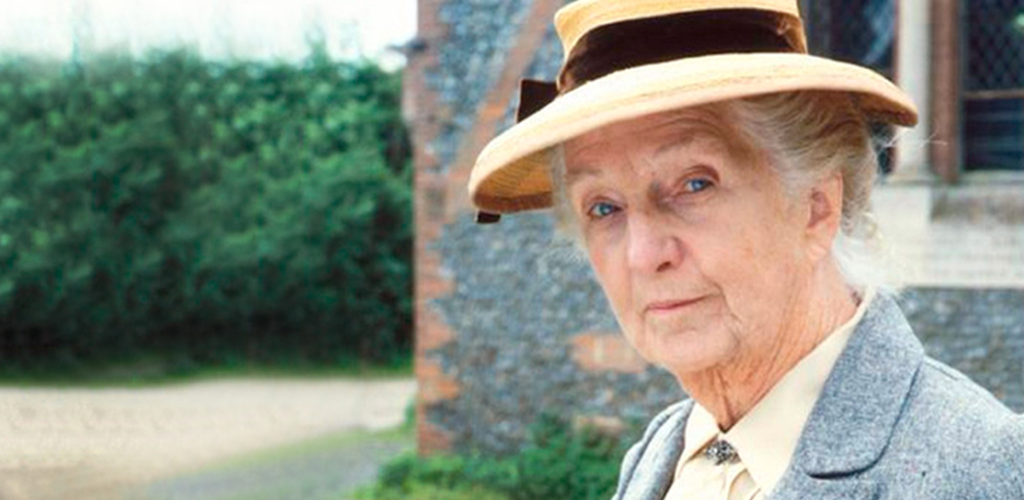“Jane Marple. Look at her well. I tell you, that woman knows more about the different kinds of human wickedness than anyone I’ve ever known,” says a character in an Agatha Christie story.
In another story, Miss Marple explains, “Human nature is much the same everywhere, and, of course, one has opportunities of observing it at closer quarters in a village.”
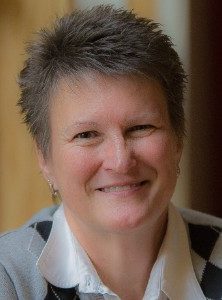
Susan Shaw
And it’s her gift, “a certain knowledge of human nature,” as she explains it, that propels Miss Marple’s sleuthing across 12 novels and 20 short stories.
I teach a course on Gender, Race and Class in British Murder Mysteries and Crime Dramas, and my students are always surprised at just how much we can learn about human nature and systems of oppression by reading crime fiction. At the core of the best crime fiction is a moral universe that explores justice and the myriad ways it is achieved — or not.
In this present moment of moral and ethical crises — and a good dash of dystopia — British murder mysteries actually have a lot to teach us. I’ll use examples from some of the novels I teach so you can start your own reading list if you’re not already a fan.
Central to these stories is an act (or acts) of violence that disrupts the community and the social order. Many crime novels satisfy our desire for justice by making sure that by the end of the novel the killer is identified, arrested and jailed. Justice is served, we feel.
“They point to much deeper human struggles, social issues and systemic failures, even as they entertain us with a bloody suspenseful story.”
The novels I teach are rarely that simple. They point to much deeper human struggles, social issues and systemic failures, even as they entertain us with a bloody suspenseful story.
Let’s take Agatha Christie as an example of the classic whodunit. Christie always leaves us enough clues to solve the mystery ourselves, and at the end we usually have the big reveal of the killer. Yet if we read closer, we begin to realize a lot more is going on than just a question of whodunit. Miss Marple lives in quaint St. Mary Mead, but all around her are murders which suggest that not even the bucolic worlds of small English villages are immune to murder, as all of you who watch Midsomer Murders already know.
Christie also is famous for the “locked room” mystery — a story with a largeish set of characters in a limited space that requires one of them be the killer. Inevitably, we discover that almost everyone in the room — or on the island or in the hotel — has a motive and dissembles or lies about it. And when everyone is a suspect, we realize we are all quite capable of hiding things, keeping secrets, doing wrong and maybe even committing murder.
“When everyone is a suspect, we realize we are all quite capable of hiding things, keeping secrets, doing wrong and maybe even committing murder.”
Christie pioneered the technique of the unreliable narrator. The person who tells the story isn’t necessarily truthful or may have an unknown vested interest — and we may not even know this as readers if we don’t read suspiciously from the get-go (I won’t tell you which novel so I don’t spoil it for you). Ruth Ware uses this technique in In a Dark, Dark Wood when the main character sustains a head injury that means she doesn’t remember what happened.
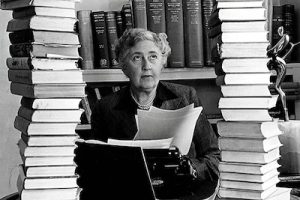
Agatha Christie
What does the possibility of an unreliable narrator suggest about the world? Surely, this should give us pause about simply accepting the information we’re given. That’s certainly an apt warning in this time when misinformation, disinformation, falsehoods and lies fill popular discourse. As Hercule Poirot says, “Wherever there is human nature, there is drama. But it is not always just where you think it is.”
Of course, Christie herself is complicated. Her critics debate her antisemitism, racism and elitism. Some see her as thoroughly a product of Britain’s colonial legacy. Others argue that she challenges stereotypes by deploying them in critical ways.
Good crime fiction also gives us complicated characters who disrupt simple binaries of good and bad. Val McDermid’s Skeleton Road, for example, explores the complexities of characters caught up in the Balkan war and the meanings of justice within the context of state violence and genocide. A.A. Dhand’s Harry Virdee in One Way Out is a Sikh Bradford, UK, detective who uses questionable sources and means to stop a bombing.
“We’re all in need of redemption, and we all have something worth saving.”
These complicated characters can challenge us to recognize that none of us is fully good or fully bad either. We’re more than the worst thing we’ve ever done, and we can both do good and do evil. We’re all in need of redemption, and we all have something worth saving.
Often, we see protagonists caught in binds between identities and expectations like Etta Fitzroy in Fiona Cummin’s Rattle, an astute detective whose personal struggles to have a child affect her work on the case, or Patrick Fort in Belinda Bauer’s Rubbernecker, a medical student who has a difficult time when he tries to communicate the murder he has discovered because he is on the autism spectrum.
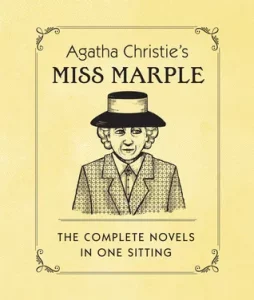 Beyond questions of individual human nature and personal struggles, the best of crime fiction also helps us take a hard look at larger oppressive social systems and institutions. Many British crime novels, for example, point to the failings of the police/justice system. In Nicci French’s House of Correction, the police take the easy path and arrest the most obvious suspect who must then solve the crime from her jail cell.
Beyond questions of individual human nature and personal struggles, the best of crime fiction also helps us take a hard look at larger oppressive social systems and institutions. Many British crime novels, for example, point to the failings of the police/justice system. In Nicci French’s House of Correction, the police take the easy path and arrest the most obvious suspect who must then solve the crime from her jail cell.
Other novels show how contexts of prejudice and discrimination shape crime and justice systems. Disability is central to Rattle, for example. Its victims are children with bone disorders, which is disturbing in a lot of ways.
Laura Shepherd-Robinson’s Blood & Sugar is a historical mystery set during England’s slave trade, and it draws on the real-life horror of the Zong, a slaving ship whose enslavers threw captive Africans overboard to drown because they realized they’d recoup more money from insurance than from selling the people who had become sick and weak during the voyage.
In Kia Abdullah’s Truth Be Told and Sarah Waters’ The Paying Guests, homophobia and heteronormativity form the social backgrounds that propel the novels. Truth Be Told and One Way Out also draw on experiences of anti-Asian and anti-Muslim sentiment in the UK to create even more thorny contexts for their characters.
Rather than simply identifying guilty individuals, all of these novels point to social and collective guilt that requires structural solutions. In them, the mystery may be solved, but the larger social problems are not, leaving us not quite fully satisfied that justice has been done.
“Rather than simply identifying guilty individuals, all of these novels point to social and collective guilt that requires structural solutions.”
Books without easy endings, like Skeleton Road, Truth Be Told, and The Paying Guests remind us what a complicated practice justice is. In these kinds of novels, we don’t always end up with a resolution that fits within the justice system; sometimes we don’t end up with justice at all; and sometimes we’re not even sure what justice should be, given the context. The justice system may fail. Killers may get away with it. We may even root for the killer to get away with it because we think the victim deserves to die.
These uneasy endings turn the story back on us as readers. We’re implicated in the stories as part of these larger unjust systems, and we have to ask what our role is as members of societies that practice injustice or as readers who wish a character dead and the murderer to get away with it. What does that say about us?
These stories can help us think more critically about the difficult moral and ethical questions of our age, in a moment when temptations toward simplistic answers can call to us — whether on social media or from a pulpit. The moral universe of these books is not so different from our own, and the mysteries they explore are really mysteries of the human soul.
After all, as Agatha Christie observed, “There is, as Miss Marple would say, a lot of human nature in all of us.”
Susan M. Shaw is professor of women, gender and sexuality studies at Oregon State University in Corvallis, Ore. She also is an ordained Baptist minister and holds master’s and doctoral degrees from Southern Baptist Theological Seminary. Her most recent book is Intersectional Theology: An Introductory Guide, co-authored with Grace Ji-Sun Kim.
Related articles:
Preachers: Read fiction to learn human condition, not for sermon fodder
Inside the spiritual life of Anne Lamott
Reading good literature can develop skills in empathy and compassion, professor says

